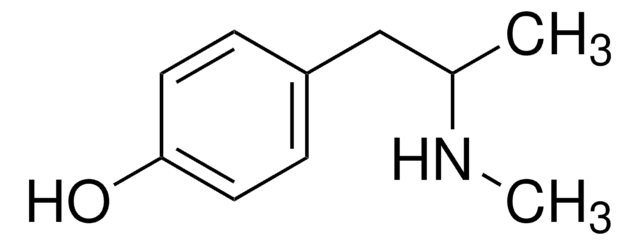M1796
(±)-3,4-Methylenedioxy-N-ethylamphetamine hydrochloride
≥98% (TLC)
Synonyme(s) :
MDEA hydrochloride, N-Ethyl-3,4-MDA hydrochloride
About This Item
Produits recommandés
Niveau de qualité
Pureté
≥98% (TLC)
Contrôle du médicament
USDEA Schedule I; Home Office Schedule 1; stupéfiant (France); kontrollierte Droge in Deutschland; regulated under CDSA - not available from Sigma-Aldrich Canada; psicótropo (Spain); Decreto Lei 15/93: Tabela IA (Portugal)
Chaîne SMILES
Cl[H].NCCc1ccc2OCOc2c1
InChI
1S/C12H17NO2.ClH/c1-3-13-9(2)6-10-4-5-11-12(7-10)15-8-14-11;/h4-5,7,9,13H,3,6,8H2,1-2H3;1H
Clé InChI
IBDIPBWIXJRJQM-UHFFFAOYSA-N
Actions biochimiques/physiologiques
Autres remarques
Mention d'avertissement
Danger
Mentions de danger
Conseils de prudence
Classification des risques
Acute Tox. 3 Oral - STOT SE 3
Organes cibles
Respiratory system
Code de la classe de stockage
6.1C - Combustible acute toxic Cat.3 / toxic compounds or compounds which causing chronic effects
Classe de danger pour l'eau (WGK)
WGK 2
Point d'éclair (°F)
Not applicable
Point d'éclair (°C)
Not applicable
Équipement de protection individuelle
Eyeshields, Faceshields, Gloves, type P3 (EN 143) respirator cartridges
Certificats d'analyse (COA)
Recherchez un Certificats d'analyse (COA) en saisissant le numéro de lot du produit. Les numéros de lot figurent sur l'étiquette du produit après les mots "Lot" ou "Batch".
Déjà en possession de ce produit ?
Retrouvez la documentation relative aux produits que vous avez récemment achetés dans la Bibliothèque de documents.
Notre équipe de scientifiques dispose d'une expérience dans tous les secteurs de la recherche, notamment en sciences de la vie, science des matériaux, synthèse chimique, chromatographie, analyse et dans de nombreux autres domaines..
Contacter notre Service technique









